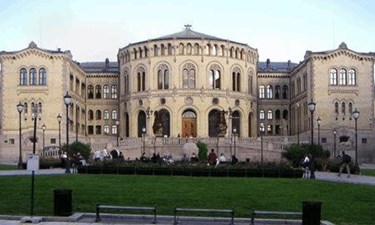Norway Turns Off Analog FM Radio To Go Fully Digital
By Jof Enriquez,
Follow me on Twitter @jofenriq

Norway is set to become the first country to switch over from analog frequency modulation (FM) radio transmission in favor of a digital format. Several countries could follow suit in what could be the death knell for traditional radio technology.
The Norwegian Parliament set in motion the planned demise of FM radio in the country in 2011, and it gave the final go-ahead for the move last month, starting with a shutdown of FM broadcasts in the northern city of Bodø on Jan. 11, reports CBC/Reuters. When the multi-stage shutdown rolls through the rest of the country and is completed by the end of 2017, all national FM broadcasts will be switched off in favor of the Digital Audio Broadcasting (DAB) standard.
Analog FM since the 1930s has been the modulation standard for high-frequency, high-fidelity radio transmission, and remains in widespread use for walkie-talkies, police and military radios, RF and microwave test equipment, telemetry, and other systems. Digital radio transmission, however, is more resistant to interference and eliminates many imperfections of analog radio transmission and reception, which can be a problem in some of Norway's regions where fjords and mountains interfere with FM signals.
Wealthy Norway has successfully expanded its digital radio coverage to 99.5 of the country's area, but there's still a dearth of digital radios, including onboard most of Norway's cars. A recent poll reportedly showed that 66 percent of Norwegians oppose the switch to digital, according to an opinion poll published by the daily Dagbladet last month.
"We are simply not ready for this yet," Ib Thomsen, an MP from the Progress Party, a partner in the Conservative-led government, told CBC/Reuters. "There are two million cars on Norwegian roads that don't have DAB receivers, and millions of radios in Norwegian homes will stop working when the FM net is switched off. So there is definitely a safety concern."
However, all counties in Norway and at least half the nation’s municipalities have places where people can take their cars for modification, and install DAP adapters for under €100 (around US $110), according to Spectrum. With the DAB network in place and the government going full on with the switchover, more Norwegians are expected to start shopping for DAB receivers.
Other countries mulling their own shutdown of analog FM radio broadcasts are closely monitoring Norway's experience of switching over to digital radio.
"We're the first country to switch off FM but there are several countries going in the same direction," said Ole Joergen Torvmark, head of Digital Radio Norway, which is owned by national broadcasters NRK and P4 to help the transition, reports CBC/Reuters.
The United Kingdom reportedly will roll out a similar plan once digital listening reaches 50 percent, which could happen as early as the end of 2017, says Digital Radio U.K. spokeswoman Yvette Dore.
Denmark and Switzerland are quite close to being able to move away from FM, says Peter Senger, former R&D head for the German broadcaster Deutsche Welle and an advocate of digital broadcasting, according to Spectrum.
Still, unlike television, videos, and music, traditional analog radio has proven quite resilient to the digital revolution.
Interestingly, Norway's Nordic neighbors Sweden and Finland have so far failed to transition from FM to DAB, says Digital Radio FM Insider.
In the United States, the Federal Communications Commission (FCC) approved iBiquity's in-band on-channel (IBOC) digital radio technology standard back in 2002, allowing radio stations to broadcast their regular FM or AM signal and their digital signal at the same frequency.
Today, about 21 percent of all FM radio stations in the U.S. transmit digitally, and most cars are equipped with digital receivers. But going fully digital is not expected to happen anytime soon.
"Powerful broadcasters and new stereo systems are only part of the conversation. Radio stations in small towns, for example, may still broadcast on analog FM — precisely what Norway is phasing out — and some people may not have the equipment to receive anything else, anyway," reports Huffington Post.
